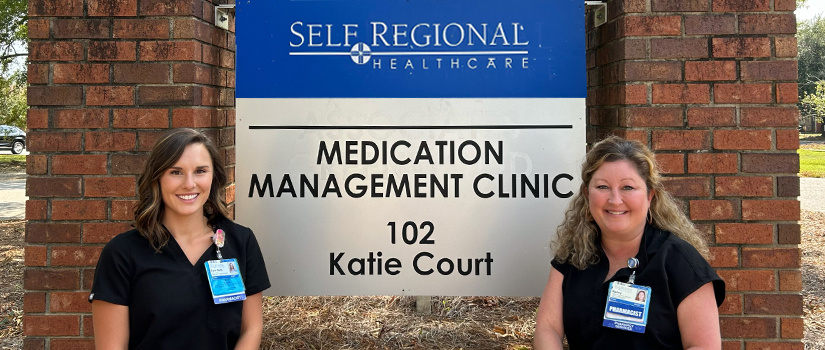As the USC College of Pharmacy celebrates American Pharmacists Month this October,
two alumni are making waves in rural health care.
Nancy Goodbar, 2008, and Sara Beth Sears, 2022, are at the forefront of an innovative medication management program at Self Regional Medical Center in Greenwood, South Carolina.
The program launched in 2021 and aims to improve access to health care in underserved communities. The Medication Management Clinic focuses on ensuring accessibility and affordability of critical medications by breaking down the barriers that prevent patients from being on optimized therapy.
Goodbar, who helped build the program together with a former student, started with minimal resources. Armed with little more than a computer and a phone, she built what is now a team of five pharmacists, three pharmacy technicians, two business office associates and an office manager. The program has served nearly 8,000 patients and maintains a referral queue of over 1,000.
The initiative faced initial challenges in gaining an understanding by the medical community of what the pharmacist’s role would be on the patient’s health care team.
“We are truly here to help provide the patients with the best care and co-manage the conditions with the referring provider,” says Sears. “We have some providers that give us autonomy when we identify areas where we can improve patient care, and we have some that want us to check back in with them before we make those adjustments.”
One of the most startling revelations came after many interactions with patients who shared similar stories.
“We have learned that so many patients were taking their medication once a day versus twice a day to make it stretch so that they do not have to decide between spending $600 on medicine or if they feed their family or pay their light bill,” Goodbar notes.
It is so much more than just picking the right medicine. It is ensuring that patients can get their medicine. It is also about sharing resources, not only with the patients but also with other health care providers.
This discovery underscores the program’s importance in addressing medication non-compliance due to financial constraints.
“Being able to help get them the medication they need without it being a financial burden is increasing their compliance and adherence. And as a result, we are seeing much-improved disease state control at their doctor follow-ups,” Goodbar adds.
Beyond patient care, the program serves as a valuable teaching tool for pharmacy students and residents.
“Our residents, especially those that have not worked in rural populations before, get to see the true barriers some of our patients face in getting their medications,” says Sears. “This helps them understand better how to work through those barriers and to know what resources are available for their future patients.”
Goodbar emphasizes the unique learning opportunity for everyone involved.
“This is not taught in school - the ins and outs of insurance, the struggles of patients, boots on the ground, and collaborative and synergistic relationships with physicians. I think residents and students learn so much in this clinic from an ambulatory care aspect and disease state management,” she adds. “It is so much more than just picking the right medicine. It is ensuring that patients can get their medicine. It is also about sharing resources, not only with the patients but also with other health care providers. It is so fulfilling.”
Topics: Alumni Programs, Pharm.D. Program
